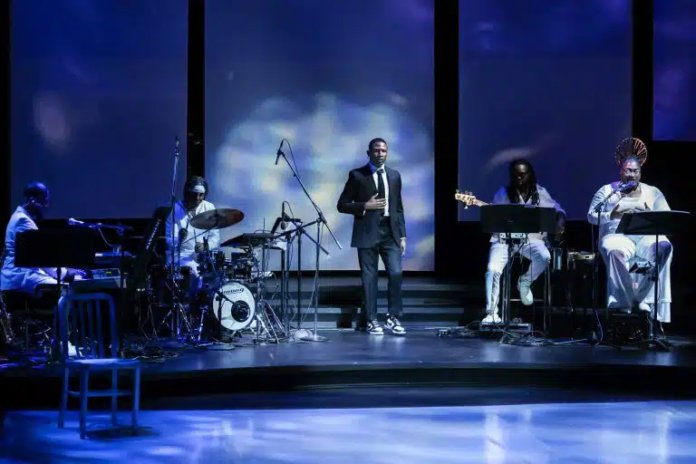
Tristan André, a playwright, performing artist and alumnus of The University of North Carolina at Chapel Hill, performed They Do Not Know Harlem: In Communion With James Baldwin, a one-man show that meditates on the legacy of James Baldwin’s work and life on March 1-12 at the PlayMakers Repertory Company in Chapel Hill.
The 75-minute performance—which André calls a “spiritual workshop”—consisted of only André and a band behind him, as he narrated the life of James Baldwin, an African-American writer who was born in Harlem during the height of the Harlem Renaissance.
“The clarity in his prose. The sharpness of his (James Baldwin) intellect. We speak his name more than ever because the need is greater. We dance. We sing. We then go tell it on the mountain!” André said, alluding to Baldwin’s first novel.
André’s performance, which debuted in 2019, has garnered rave reviews from critics.
“The movements, the music and the visuals were vital in telling the story of the commonality of Tristan André’s life and the life of James Baldwin. In this solo performance, he superbly moves back and forth between the two characters,” Phyllis Coley wrote in a March 5 review of André’s show in Spectacular Magazine, a publication based out of Durham, North Carolina.
André recalls Baldwin’s struggles of being a queer African-American in an unwelcoming world, and related it to his own life. The show also explored Baldwin’s writing, which helped raise public awareness of racial and sexual oppression.
“It is a multimedia experience, and it is a piece that transports time through my voice and through the voice of James Baldwin,” André said of They Do Not Know Harlem.
English teacher Joanne McClelland spoke about James Baldwin’s impact on both literature and African American history.
“James Baldwin was a visionary for what was to come,” she said. ¨Most of what he talked about was the struggles and obstacles African Americans had to go through at the time. He was optimistic that once white America really understood what Black America was experiencing, maybe they would look at African Americans differently.”
André explored Baldwin’s legacy through gospel and dancing, and he frequently interacted with the audience, posing questions to spectators and, in turn, answering questions they had. André considers the call-and-response features of his show part of the Africanist aesthetic he hopes to perpetuate with They Do Not Know Harlem.
“The audience was actively present and engaged,” André said.
Through the show’s choreography, André mirrored Baldwin’s journey from a child to a young man and his struggle to accept and be open about his queerness, while also trying to fit in with the Black church and culture of Harlem at the time.
André attempted to show another aspect of Baldwin’s life by incorporating different genres of dance since Baldwin was born into the height of jazz and blues and died after hip hop and rap’s birth.
Once the performance concluded, André invited the audience to join him as his “chains fall off,” which revealed his joy from finally being free of adversity and hardships.
“How James Baldwin impacted my life was present throughout the show,” Tristan André said. “He taught me to be me.”











